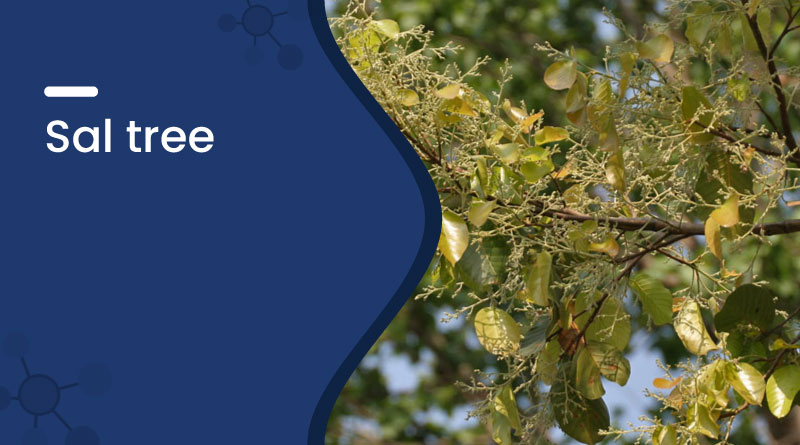Sal Tree Benefits, Uses & Importance


The Sal tree (Shorea robusta) is a sacred and medicinal tree with deep roots in Ayurveda. It is commonly found in India, Nepal, and parts of Southeast Asia. Known for its tall structure, hardwood, and resinous exudate, Sal holds both spiritual and therapeutic value. In Ayurveda, various parts of the Sal tree—resin, bark, leaves, and seeds—are used to treat wounds, inflammation, skin diseases, diarrhea, and bone disorders.
This blog explores the Ayurvedic importance of the Sal tree, its nutritional and herbal profile, major benefits, traditional uses, safe dosage, and frequently asked questions.
Nutritional and Herbal Value of the Sal Tree
The Sal tree is valued for its medicinal resin, rich in antiseptic, anti-inflammatory, and astringent properties. Each part of the tree supports healing, especially for external injuries, joint pain, skin ailments, and digestive issues.
Below are different parts and benefits:
- Resin (Rala): The dried exudate from the bark, used in wound healing and skincare.
- Bark: Contains tannins that help reduce inflammation and stop bleeding.
- Leaves: Antibacterial, helpful in skin issues and ulcers.
- Seeds/Oil: Nourishing, used in joint problems and as a base for Ayurvedic balms.
Importance of Sal Tree in Ayurveda
The Sal tree is important in Ayurveda for balancing body energies. Its resin cleanses and seals wounds. Commonly used for healing skin problems, wounds, and bone issues, it plays a key role in traditional medicines and natural health practices.
Therapeutic Benefits of the Sal Tree
Sal Tree for Wound Healing
Sal resin works like a natural antiseptic. When applied to cuts or burns, it helps stop bleeding, keeps germs away, dries the wound, and speeds up healing. It is especially helpful for skin ulcers, cuts, and blisters.
Sal Tree for Skin Diseases
The bark and resin of the Sal tree have antibacterial and astringent effects. When applied to acne, eczema, or boils, they reduce swelling, itching, and pus. Regular use helps in managing long-term skin issues naturally and safely.
Sal Tree for Diarrhea and Dysentery
Sal bark contains tannins that tighten the gut lining. This helps stop loose stools and reduces swelling in the intestines. A decoction of the bark is useful in both sudden and long-lasting cases of diarrhea and dysentery.
Sal Tree for Joint Pain and Inflammation
Sal seed oil is warm and nourishing. When massaged onto joints or muscles, it eases stiffness and swelling. It helps reduce pain in arthritis, body aches, and similar inflammatory joint problems over time with regular use.
Sal Tree for Bone Problems
The resin from Sal is used in traditional healing to support broken bones and weak joints. It helps rebuild damaged tissues and speeds up recovery from fractures. It also improves bone strength when used with other herbal remedies.
Sal Tree for Gum Swelling
Chewing Sal twigs or using bark water as a mouth rinse reduces gum swelling, bleeding, and mouth sores. Its astringent nature tightens gums and keeps the mouth clean by fighting bacteria that cause infections and bad breath.
Sal Tree for Excessive Sweating
Sal has a cooling and pore-tightening effect. Applying it to areas like armpits or palms reduces sweat and controls bad odor. It helps people who sweat too much, keeping the skin dry and fresh naturally without chemicals.
Sal Tree for Bleeding Disorders
Sal resin or bark helps stop bleeding from the nose, gums, or wounds. Its natural property seals small blood vessels and supports clotting. It is useful in managing minor internal or external bleeding conditions without harsh side effects.
Sal Tree for Respiratory Issues
Smoke from Sal resin has been traditionally used to ease blocked noses. Inhaling its fumes during colds helps clear mucus, making it easier to breathe. Though not a main use, it offers relief during mild breathing problems or flu.
Sal Tree for Skin Concerns
Sal seed oil is soft, light, and full of moisture. It is used in natural creams to soften skin, reduce wrinkles, and improve skin tone. It hydrates dry skin without clogging pores, making it ideal for daily skincare.
How to Use Sal Tree: Forms, Dosage & Methods
| Dosage Forms | Benefits | How To Use |
|---|---|---|
| Resin or paste | Heals wounds, burns, ulcers, acne, eczema, and improves skin condition. | Apply morning or evening after cleaning skin or wound for better healing. |
| Decoction | Treats diarrhea, oral issues, and cleans wounds using boiled bark water as a rinse or drink. | Use twice daily after meals or as directed for effective relief. |
| Oil | Soothes joint pain, nourishes skin, and reduces inflammation when used in massage or ointments. | Apply at bedtime or during massage for deeper absorption and pain relief. |
| Smoking Resin | Eases chest congestion by inhaling fumes of resin, used in traditional respiratory practices. | Use during chest congestion under expert supervision, not for daily use. |
Safety Tips for Using Sal Tree
- Medical Supervision: Internal use should be done only under Ayurvedic expert supervision, especially for resin or bark.
- Allergy Test: Always test a small patch before applying resin or oil topically.
- Pregnancy & Children: Not recommended without professional advice.
- Storage: Store resin and bark in a cool, dry place.
Final Thoughts
The Sal tree offers more than strong timber—it’s a natural healer. Used in Ayurveda, it helps wounds, skin issues, joint pain, and diarrhea. Its benefits are powerful, but proper use is vital. In skincare, pain relief, or healing, Sal provides gentle, traditional support for health and well-being.
Frequently Asked Questions (FAQs)
Q: Is Sal tree resin safe for direct skin application?
A: Yes, but always test a small area first to check for allergic reactions.
Q: Can I consume Sal resin for joint or digestive issues?
A: Only under supervision. Internal use requires proper formulation and dosage as advised by an Ayurvedic practitioner.
Q: Is Sal tree oil good for skin?
A: Yes, it provides nourishment to the skin, improves moisture level, and is useful in various skincare formulations.
Q: Can it be used to treat acne?
A: Yes, the astringent and antibacterial properties of Sal bark help reduce acne and skin inflammation.
Recent Blogs
Disclaimer : Zeelab Pharmacy provides health information for knowledge only. Do not self-medicate. Always consult a qualified doctor before starting, stopping, or changing any medicine or treatment.
















 Added!
Added!